The metaverse is one of the most controversial and frequently talked about new innovations in the world of tech, and among the few areas in which it can be seen to have a practical impact is that of gaming. With consumers between the ages of 13 and 17 increasingly picking gaming as their pastime of choice, the metaverse stands poised to capture this demographic and keep a tight hold on it for the next few decades if it is implemented right.
With all of that having been said and now out of the way, it is important to note that a new report from Bain & Company revealed that younger gamers are readily adopting the metaverse and incorporating it into their gaming experiences. Most older gamers don’t seem to be interested in the metaverse, but in spite of the fact that this is the case the younger demographics are more than making up for this.
Additionally, around 50% of younger individuals seem eager to use the metaverse for other types of socializing as well. The same proportion of Gen Z respondents said that they would prefer hanging out with friends in the metaverse as opposed to real life, and a similar percentage also stated that they would enjoy attending school events like this in the future.
Several games like Roblox and Minecraft have metaverse-like features that companies like Meta would likely want to expand on. However, Meta’s attempts at creating the metaverse don’t seem to be appealing to the right individuals. Meta’s focus appears to be on adults working from home by offering them digital office spaces, and this is the wrong path to take if statistics are factored in.
Young gamers appear to be the only major demographic that might help make the metaverse a success. They will need to be listened to moving forward so that the metaverse can be optimized according to their needs. Kids who grow up in digital worlds will be more used to them, and that offers the metaverse the chance to become truly profitable if the current trends continue to persist.
Read next: Research shows smartphone sales decreased by nine percent YOY in the second quarter of 2022, along with the economic crisis
With all of that having been said and now out of the way, it is important to note that a new report from Bain & Company revealed that younger gamers are readily adopting the metaverse and incorporating it into their gaming experiences. Most older gamers don’t seem to be interested in the metaverse, but in spite of the fact that this is the case the younger demographics are more than making up for this.
Additionally, around 50% of younger individuals seem eager to use the metaverse for other types of socializing as well. The same proportion of Gen Z respondents said that they would prefer hanging out with friends in the metaverse as opposed to real life, and a similar percentage also stated that they would enjoy attending school events like this in the future.
Several games like Roblox and Minecraft have metaverse-like features that companies like Meta would likely want to expand on. However, Meta’s attempts at creating the metaverse don’t seem to be appealing to the right individuals. Meta’s focus appears to be on adults working from home by offering them digital office spaces, and this is the wrong path to take if statistics are factored in.
Young gamers appear to be the only major demographic that might help make the metaverse a success. They will need to be listened to moving forward so that the metaverse can be optimized according to their needs. Kids who grow up in digital worlds will be more used to them, and that offers the metaverse the chance to become truly profitable if the current trends continue to persist.
Read next: Research shows smartphone sales decreased by nine percent YOY in the second quarter of 2022, along with the economic crisis

